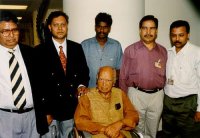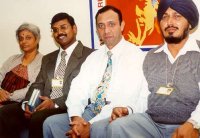
News Archive
Literary Recordings Project Goes Regional
(April 2002)
Two years after it was launched in New Delhi in April 2000,
the project to record South Asian authors reading from their works
for the Library of Congress has now become truly regional, as
the office began to capture the voices of prominent men and women
of letters from Bangladesh and Sri Lanka. Since its inception,
the office has recorded seventy-nine
authors representing eighteen of the languages spoken in the
region. So far, sixty-eight writers are from India, four from
Bangladesh, and seven from Sri Lanka, and more authors remain
to be recorded in each of these countries. Other countries from
the region, among which Nepal and Pakistan, will be included in
the project in the future.
The first Bangladeshi authors were recorded in Dhaka in May 2001.
Sri Lankan authors were included in March 2002, during a visit
to Colombo of New Delhi's Deputy Field Director Dr. Carol Mitchell.
In both countries, the American Embassy's Public Affairs Office
assisted the project providing logistical and technical support.
As happened in India, the project, now officially called The
South Asian Literary Recordings Project, has been very well received
in both countries and generated considerable positive press coverage.
In Dhaka, Counselor for Public Affairs Mr. John Kincannon welcomed
Mr. Shamsur Rahman, the eminent poet of Bangladesh, who was the
first to record for the Library of Congress. Poet Nirmalendu Goon,
and novelists Humayun Ahmed and Selina Hossein followed with their
selections.
Deputy Field Director Carol Mitchell launched the project in
Colombo during three days of intense activity. Seven authors writing
in Sinhalese, Tamil and English came to the American Center's
premises to record. Among them were English writers Punyakante
Wijenaike and Anne Ranasinghe; Sinhalese writers Somaratna Balasooriya,
Gunadasa Amarasekera, K. Jayatilake and A.V. Suraweera; and Tamil
writer M. Ponnambalam. Between them, the writers from Bangladesh
and Sri Lanka contributed eight-and-a-half hours of recorded literature
for the Library's collections.
The South Asian Literary Recordings Project will be soon accessible
to users anywhere as one of the first international collections
to be digitized and mounted in its entirety on the Library of
Congress web site. For this purpose, a prototype has already been
developed and the digitization work is under way in Washington.
|
Literary Recordings Project Celebrated Library's Bicentennial
In India
(August 2000-February 2001)
|
| |
| Launched in April 2000 by Ambassador
to India Richard F. Celeste, a project to record the voices
of South Asian authors for the Library's Archive of Recorded
World Literature has captured on tape the readings of many
prominent Indian and Bangladeshi poets, novelists and playwrights.
The authors recorded so far
represent sixteen of the languages of the sub-continent. |
|
| Conceived by the New Delhi office to celebrate
the Library's Bicentennial, the project is being executed
by the staff of the office with assistance from the American
Embassy's Public Affairs sections in New Delhi, Chennai (Madras),
Mumbai (Bombay) and Kolkata (Calcutta). The project aims to
create a collection representative of the linguistic and literary
diversity of the region to complement the extensive holdings
in traditional book format acquired by the Library since the
opening of its New Delhi regional office in January 1962. |

|
Towards this end,
the office will continue to record authors from India and
other South Asian countries in the months ahead. From its
launching at Roosevelt House, the Ambassador's residence,
the project has gained the support of the literary community
and has attracted a great deal of attention in the press. |
| Members of the TV and print media have covered
the recording sessions and interviewed authors and office
staff alike in all four cities where the recordings took place.
The favorable coverage highlighted the fact that the project
includes all the major literary languages of India, English
included, and will result in the preservation of the writers'
voices for posterity. Nirmal Verma, one of India's foremost
Hindi writers, was the first to record in New Delhi. He was
followed by two exponents of Malayalam literature, the poet
K. Satchidanandan and novelist Mukundan. Three of the most
famous representatives of the growing numbers of Indians who
write in English came next. |
| Journalist, novelist and historian
Khushwant Singh, whose career spans five decades, read from
his celebrated novel of Partition, A Train to Pakistan, and
from one of his major works, History of the Sikhs. Novelist
and social activist Arundathi Roy, who won the Booker Prize
for her maiden novel The God of Small Things, read the chapter
that gives name to her novel. |
|
| Novelist and member of the Indian Civil Service,
Upamanyu Chatterjee, read portions of his best-seller novel
English, August. The first group also included Telugu writer,
lyricist and Member of Parliament C. Narayana Reddy. In August
2000, four Tamil writers recorded for the Library in Chennai.
The presence of this group attracted a large media presence
to the American Center where the recordings took place. The
regional TV and press covered the event, which included recordings
by poet and star lyricist Vairamuthu, as well as Ashokamithran,
Rajam Krishnam and Sivasankari. India's classical language,
Sanskrit, is represented by two of its best writers, Ram Karan
Sharma and Rama Kant Shukla, who recorded the same day in
November. Urdu poet Kaifi Azmi read in New Delhi before a
live audience invited for the occasion, and briefly under
the glare of television lights. The Asian Star TV channel
televised the event and interviewed Field Director Lygia Ballantyne
about the literary project. |
|
|
The news clip was carried throughout the
day in both Star's Hindi and English news channels. In Mumbai,
eleven authors were greeted with flowers and tea by the
hosts, Assistant Public Affairs Officer Anne Grimes and
Ashok Butani, head of the New Delhi office's Acquisitions
Section, who supervised the event.
|
| Mumbai, the most cosmopolitan
of Indian cities, provided the Library with recordings in
English, Marathi, Gujarati, Kannada, Sindhi and Urdu. The
major dailies covered the event with feature articles and
photographs, as well as interesting interviews with the authors.
Among those recorded in Mumbai were veteran English writer
Mulk Raj Anand, whose Untouchable, published in London in
1935, was arguably one of the first Indian novels in English
to gain recognition in the West, and Namdev Dhasal who pursued
parallel literary and political careers, the latter as a member
of the Dalit Panthers Party. Gujarati writer Varsha Adalja,
after interpreting both Sita and Mandodari, in a dialogue
between the two women from her book titled Mandodari, mused
"At an unknown time, an unknown person may be touched by this
recording". |
| The press interviews upset the
recording schedule and caused a number of authors to overlap,
resulting in impromptu and lively exchanges between authors
over tea. In Calcutta, recently renamed Kolkata, the recordings
had to vie for attention with the famous annual Book Fair,
the high point of the cultural calendar of this book-loving
city. |
|
| Eleven Bengali authors and one Rajasthani poet
recorded during three days of hectic activity at the Consulate
General. Major writers such as Sunil Gangopadhyay, Nabanita
Dev Sen, and Subhas Mukherjee, were represented. They followed
their fellow Bengali and famous novelist Mahasveta Devi, who
had recorded earlier in New Delhi reading, among other things,
from one unpublished work. The Telegraph, one of the city's
major English dailies, devoted half a page to the recordings
project under the headline "Words Find Voice". |
|
|
The feature carried a large size photograph
of the Library's Main Reading room surrounded by the authors'
photographs. The Times of India's article quoted one of
the author's praise for the organization of the event. Sanjiv
Chattopadhyay professed to being "delighted with the experience,
the orderliness of it right from start to finish".
|
| The Bengali press covered the
event extensively. In February, the office took advantage
of the presence in Delhi of many authors who came for the
annual Festival of Letters organized by the Indian Academy
of Letters, the Sahitya Akademi, to invite several to record.
Among them were Qurratulain Hyder, the doyenne of Urdu writers,
and Assamese author Indira Goswami, considered one of the
major literary talents of India. Kannada writers Vaidehi and
Sarah Aboobakar, also in Delhi for the Festival of Letters,
came together to the American Center, where they had an opportunity
to see many Kannada books received recently by the office. |
| Oriya writer Ramakanta Rath, the
current President of the Sahitya Akademi was also recorded.
The tapes resulting from this project will be housed at the
Library's Motion Picture, Broadcasting and Recorded Sound
Division, where they will join an impressive collection of
literary recordings from all parts of the world. |
|
| These include four Indian writers who recorded
for the Library of Congress in the eighties: Ashok Vajpeyi,
A.K. Ramanujan, Uma Shankar Joshi and Gieve Patel. Copies
of the new recordings will be deposited with the Sahitya Akademi
in New Delhi and a copy will be given to the authors. |
 |
Other recordings will be made in the months
ahead, beginning in Bangladesh. In April, office staff and
specialists in Washington were working on digitizing the
recordings to make them available on the Library's web site,
where they will be gathered under the title The South Asian
Literary Recordings Project. The project will highlight
one of the richest and most varied literary traditions in
Asia, and will call attention to the Library's considerable
holdings in this field.
|
|
Library's Bicentennial Celebrated in India
(April/May, 2000)
The Library of Congress
was very much in the news this month in India, where the Bicentennial
was celebrated with cultural events in both New Delhi and Mumbai (Bombay).
On April 17th, American Ambassador to New Delhi Richard Celeste hosted
a reception in honor of the Bicentennial at his residence. Over 150
guests representing the worlds of literature, academia, publishing,
book distribution and libraries attended the event. The occasion saw
the Ambassador with Library's field director for New Delhi, Lygia Ballantyne,
launching a project to record writers from the sub-continent reading
from their works for the Archive of World Literature on Tape. The event
received considerable coverage in the Indian English press as well as
in the Hindi, Urdu and Malayalam press.
On May 3rd, Dr.
Allen Thrasher, the Library's South Asian specialist, spoke about the
role of the Library of Congress at New Delhi's India International Centre.
The lecture was sponsored by DELNET, a network of Delhi libraries. The
session was presided by Dr. R.V. Vaidyanatha Ayyar, India's Secretary
of Culture. Dr. Thrasher was on a visit to the Library's office in New
Delhi.
On May 11th, Dr.
Billington was the principal guest during a digital video conference
organized by the American Consulate in Mumbai, in honor of the Library's
Bicentennial. Jo Ann Jenkins, Chief of Staff, and co-Chair of the Library's
Bicentennial Committee, Laura Campbell, National Digital Library Director,
and Allen Thrasher, Senior Reference Librarian in the Asian Division,
participated as advisors. Dr. Billington spoke from Washington before
an audience of academicians, conservationists, and librarians who had
gathered in Mumbai.
Also during the
week, Indian newspapers covered the opening of the exhibit on the centenary
of the The Wonderful World of Oz and the launching of the LC's new site,
America's Story from America's Library, http://www.americaslibrary.gov/.
 Library
of Congress Library
of Congress
Comments: New Delhi Office
(February 11, 2003)
|